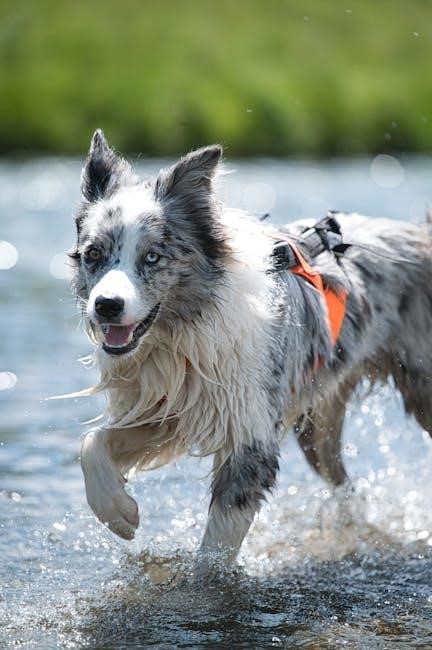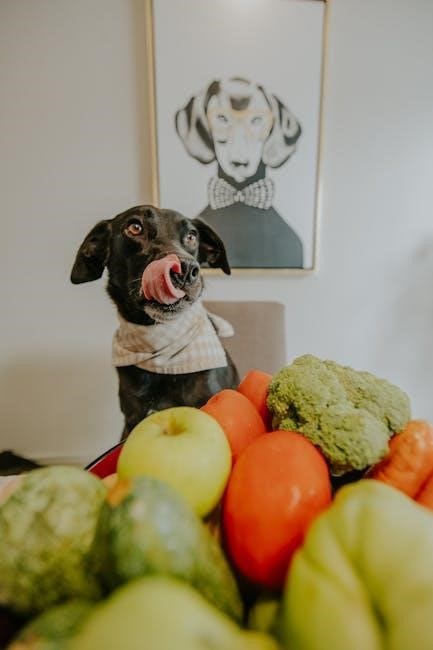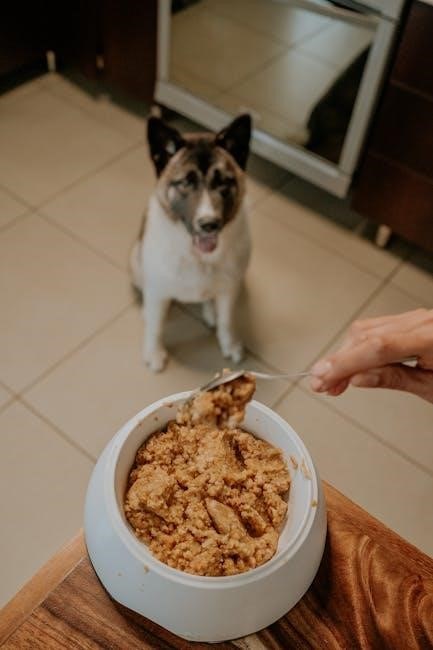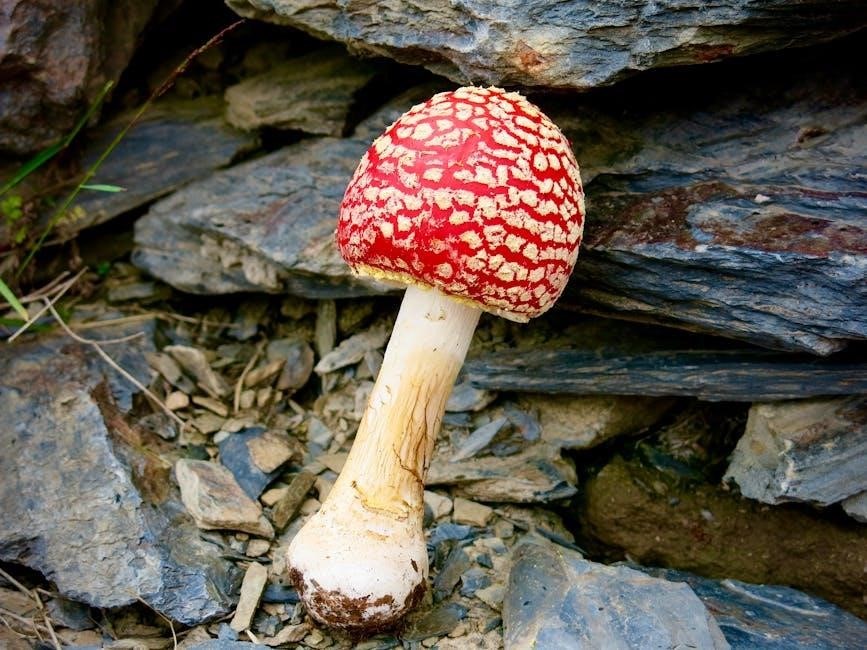Some human foods, while harmless to us, can be toxic to dogs, causing severe health issues or even death. Dogs have unique digestive systems, making certain foods dangerous. Awareness is key to protecting your pet.

1.1 Understanding the Risks of Human Foods for Dogs

Human foods can pose significant risks to dogs due to their unique physiology and metabolism. While certain foods are harmless to humans, they may contain toxins like theobromine, persin, or other compounds that can harm dogs. Understanding these risks is crucial for pet owners to prevent accidental poisoning. Common toxic substances include chocolate, avocados, grapes, and onions, which can cause symptoms ranging from mild discomfort to life-threatening conditions. The severity of poisoning often depends on the dog’s size, breed, and the amount consumed. Recognizing the signs of toxicity, such as vomiting, diarrhea, tremors, or difficulty breathing, is essential for timely intervention. Awareness of these dangers ensures safer food choices and a healthier environment for dogs. Always consult a veterinarian before sharing human foods with your pet to avoid potential harm.
Common Toxic Foods for Dogs

This section highlights common human foods that are harmful to dogs, such as chocolate, grapes, and onions, which pose serious health risks. Awareness is vital for pet safety.
2.1 Chocolate and Caffeine
Chocolate and caffeine are highly toxic to dogs due to a compound called theobromine, which their bodies metabolize slowly. Even small amounts can cause heart issues, tremors, and seizures in dogs. Dark chocolate is especially dangerous, containing higher concentrations of theobromine compared to milk chocolate. Symptoms of chocolate poisoning may include excessive thirst, vomiting, diarrhea, and an irregular heartbeat. In severe cases, it can lead to epilepsy-like seizures or even heart failure, which can be fatal. Caffeine, found in coffee, tea, and energy drinks, poses similar risks. It is crucial for dog owners to keep all chocolate and caffeinated products out of their pet’s reach. Immediate veterinary attention is essential if ingestion occurs, as prompt treatment can prevent long-term damage or death. Always monitor your dog’s environment to ensure their safety and well-being.

2.2 Grapes and Raisins
Grapes and raisins are among the most toxic foods for dogs, though the exact reason for their toxicity remains unclear. Even small amounts can cause severe health issues, including vomiting, diarrhea, and lethargy. In some cases, ingestion can lead to acute kidney failure, which may be fatal if not treated promptly. Both fresh grapes and dried raisins are equally dangerous, and there is no safe amount for consumption. Dogs of all sizes and breeds are at risk, making it crucial for pet owners to keep these foods out of reach. If you suspect your dog has eaten grapes or raisins, contact your veterinarian immediately for emergency care. Early treatment is essential to prevent long-term damage and ensure your dog’s recovery. Always prioritize your pet’s safety by avoiding these toxic foods entirely.
2.3 Avocado
Avocados contain a toxic compound called persin, which can harm dogs. While the exact toxicity varies, the fruit’s pit, skin, and leaves are particularly dangerous, as they contain higher concentrations of persin. Ingestion can cause vomiting, diarrhea, and lethargy in dogs. Additionally, avocados are high in fat, which can lead to pancreatitis, a painful and potentially life-threatening condition. In rare cases, the pit may obstruct the digestive tract, requiring surgical intervention. While small amounts of ripe avocado flesh may not be fatal, it’s best to avoid feeding it to your dog altogether to prevent any potential health risks. If you suspect your dog has eaten any part of an avocado, monitor them closely for signs of distress and consult your veterinarian for advice. Always prioritize your pet’s safety by keeping avocados out of reach. Early intervention is key to ensuring your dog’s well-being.
2.4 Onions and Garlic
Onions and garlic belong to the Allium family and contain a toxic compound called N-propyl disulfide, which can damage a dog’s red blood cells. This can lead to anemia, a condition where the blood cannot carry enough oxygen. Even small amounts, whether raw, cooked, or powdered, can be harmful. Symptoms of onion or garlic toxicity in dogs include vomiting, diarrhea, lethargy, and a lack of interest in food. In severe cases, it can cause pale gums, rapid breathing, and even collapse. The toxic effects can develop within a few days of ingestion, so it’s crucial to seek veterinary care immediately if you suspect your dog has eaten onions or garlic. Always keep these foods out of your dog’s reach, as they can cause serious and potentially life-threatening health issues. Awareness and prevention are key to protecting your pet from this common household hazard.
2.5 Alcohol
Alcohol is highly toxic to dogs, even in small amounts. Ethanol, the active ingredient in alcoholic beverages, can cause severe health issues in dogs due to their smaller body size and different metabolism. Symptoms of alcohol intoxication in dogs include vomiting, diarrhea, lethargy, lack of coordination, and difficulty breathing. In severe cases, it can lead to coma, seizures, or even death. Dogs may accidentally ingest alcohol through leftover drinks, spilled beverages, or substances like mouthwash or perfume. It’s essential to keep all alcoholic products out of your dog’s reach. If you suspect your dog has consumed alcohol, contact your veterinarian or a pet poison hotline immediately. Prompt treatment is crucial to prevent serious complications. Never intentionally give alcohol to your dog, as it can cause irreversible damage. Always prioritize your pet’s safety by storing alcohol responsibly and being aware of potential risks in your home environment.
2.6 Nutmeg
Nutmeg is a spice that can be toxic to dogs due to a compound called myristicin. While it may seem harmless, even small amounts can cause significant health issues in dogs. Symptoms of nutmeg toxicity include tremors, seizures, and central nervous system damage. These effects can occur within a few hours of ingestion and may worsen if left untreated. Dogs are particularly sensitive to myristicin, and their smaller body size increases the risk of severe reactions. It’s important to keep all spices, including nutmeg, out of your dog’s reach. If you suspect your dog has ingested nutmeg, contact your veterinarian or a pet poison hotline immediately. Early treatment is crucial to managing symptoms and preventing long-term harm. Always prioritize your dog’s safety by storing potentially toxic substances securely and being vigilant about what they might accidentally consume.

2.7 Bread Dough
Bread dough poses a significant risk to dogs due to its yeast content. When ingested, the yeast ferments in the dog’s stomach, producing ethanol and carbon dioxide. This process can lead to severe health complications. The dough expands, causing potentially life-threatening bloating and gastric dilation. Additionally, the ethanol produced can cause alcohol poisoning, leading to symptoms such as vomiting, lethargy, and even coma or death in extreme cases. Dogs are particularly vulnerable because their bodies metabolize ethanol quickly, intensifying its toxic effects. It’s crucial to keep bread dough out of reach and avoid leaving it unattended, especially in warm environments where yeast activity accelerates. If you suspect your dog has eaten bread dough, seek immediate veterinary care to prevent these serious health issues. Prompt treatment is essential to ensure your dog’s safety and well-being. Always monitor your dog’s surroundings to avoid such dangerous situations.
2.8 Mouldy Foods
Mouldy foods are highly toxic to dogs and can cause severe health issues. Mould produces mycotoxins, which are harmful compounds that can lead to a range of symptoms, including vomiting, diarrhea, lethargy, tremors, and seizures. In severe cases, these toxins can damage a dog’s liver or kidneys, potentially leading to organ failure. Common sources of mouldy foods include spoiled dairy products, rotting fruits or vegetables, and grains like pasta or bread that have been left in compost piles. Dogs are often attracted to the smell of mouldy food, making it essential for pet owners to ensure all waste is securely stored. Preventing access to mouldy foods is crucial, as even small amounts can be dangerous. If you suspect your dog has ingested mouldy food, seek veterinary care immediately to avoid long-term health complications. Prompt action can make a significant difference in your dog’s recovery and overall well-being.
2.9 Fatty Foods
Fatty foods can be highly toxic to dogs, leading to serious health complications. While small amounts of fat may not harm most dogs, excessive consumption can trigger pancreatitis, an inflammatory condition of the pancreas that can be life-threatening. Foods like bacon, sausages, and fried items are particularly dangerous due to their high fat content. Symptoms of pancreatitis include vomiting, diarrhea, abdominal pain, lethargy, and loss of appetite. In severe cases, it can lead to organ failure and death. Pet owners should avoid feeding their dogs fatty scraps or table leftovers, as even seemingly harmless treats can accumulate and cause issues over time. Moderation is key, and sticking to a balanced, nutrient-rich dog diet is essential. If you suspect your dog has consumed fatty foods and is showing signs of illness, contact your veterinarian immediately for professional advice and treatment.

Emergency Contact Information
In case of suspected poisoning, contact your veterinarian or pet poison hotlines immediately. Key numbers include ASPCA Poison Control (888-426-4435) and the National Pet Poison Helpline (800-213-6680) for urgent assistance.

3.1 Important Phone Numbers for Pet Poisoning

If you suspect your dog has ingested a toxic substance, immediate action is crucial. Contacting a pet poison hotline can provide vital guidance and save your dog’s life. The ASPCA Poison Control Center can be reached at (888) 426-4435, and they are available 24/7. Another essential resource is the National Pet Poison Helpline, accessible at (800) 213-6680. These hotlines connect you with veterinary experts who can assess the situation and recommend the best course of action. Additionally, your local veterinarian should be contacted promptly for specific advice tailored to your dog’s condition. Keeping these numbers handy ensures you can act quickly in an emergency, potentially preventing severe health complications or even saving your dog’s life. Remember, timely intervention is critical when dealing with potential poisoning.



